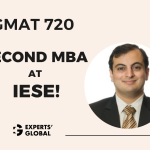Verbatim
Experts’ Global: Hi Sanjib, thank you for your time today! Could you share your journey with our readers?
Sanjib: Thanks for the chance to share my experiences here! My name is Sanjib Deka, and I hail from Australia. With an undergrad background in engineering and a professional history in sales and marketing, I decided to take the MBA leap in 2019, while working as the Country Manager for trucks and budget vehicles in Bangladesh at Tata Motors. I took the GMAT in May of 2019, and thereafter applied to several business schools and secured my admit to ESADE, starting my MBA in October 2020. I have since secured a full-time role with an Amsterdam-based start-up, and am planning to shift to the city with my family soon.
Experts’ Global: What factors do you think made a difference in your success?
Sanjib: Right after my engineering days, I decided to enter a business-related role, especially seeing my brother, who is also an MBA graduate. However, family obligations and financial constraints prevented me from pursuing a business education earlier in my life.
When I did decide to try and get an MBA admit, I knew I had a short timeline to work with, and thankfully I had considerable support from my family at the time. Relying on the help of MBA admissions consultants Experts’ Global was a good idea. They helped me keep my different application deadlines managed and assisted me with the essay crafting and interview prep aspects of the journey as well.
Experts’ Global: Looking back, what mistakes did you make along the way?
Sanjib: One of my biggest mistakes was deciding to pursue an MBA this late in my life. I also think that I could have taken the GMAT much earlier, especially because the GMAT score is valid for five years. Further, when I did take the GMAT, I was following a shorter prep timeline as I had to work on applications as soon as I was done with the exam. Taking the GMAT at a previous point in my life would have allowed me more time to leverage a good GMAT online course and I could perhaps have scored better.
My professional responsibilities also, at times, prevented me from being completely regular with my GMAT prep. Often, I had to undertake onsite visits to different parts of Bangladesh, and my day would start at 6 AM and end at 11 PM, which left me little time to rest, let alone study. Further, when shortlisting MBAs, I did not consider Indian business schools at all, which in hindsight did limit my options.
Experts’ Global: What resources did you use for your GMAT prep and what advice do you have for other aspirants about the same?
Sanjib: My primary resource was the official material from the GMAT website. I also used the Verbal Review and Quant Review, purchased test books on Verbal from Manhattan Prep, and referred to question-focused discussions on GMAT Club as additional resources. I also took some GMAT mocks at irregular intervals.
In terms of truly effective GMAT prep, I would advise other applicants to devise a proper study timeline and stick to it. Further, before you take the GMAT, be clear on the schools you are targeting. Many schools accept GRE scores in addition to GMAT scores, and in my experience, the GRE is an easier exam. Further, many schools also hold their own entrance exams in addition to accepting the GMAT. You will be aware of all these options only if your school research is in place before your GMAT prep begins.
I also feel like a lot of applicants focus on their stronger conceptual section during their GMAT prep. For me, Quant was easier than Verbal, and I ended up not compensating for my Verbal shortcomings as much as was ideal. Spending at least equal time preparing for both sections of the GMAT is essential.
Experts’ Global: What were your lessons from managing the application timelines?
Sanjib: While most applicants are usually largely concerned with acing the GMAT, it is only one part of the application. You should focus on getting your desired GMAT score in hand as soon as possible and have around two to three months in hand to fill out your application forms thoroughly, cultivate your resume, and craft compelling essays.
For those that wish to take professional help in doing so, it is a good idea as the eventual return in terms of admissions success will outweigh the costs involved. Further, do apply to three or four schools simultaneously in a single application round to maximize your chances of an admit.
Experts’ Global: How was your MBA interview experience?
Sanjib: I applied to three business schools and received an interview call from ESADE. Each business school has its own interview process and the one at ESADE was very informal. I was asked questions about my professional and personal history, how I was managing my start-up and dealing with my failures therein, why I chose ESADE, and how I planned to give back to the school community.
My prior MBA interview prep helped me immensely in the interaction, and I was put on the admission waitlist for around a fortnight. During this time, the program director visited India for an Alumni Meet in Gurugram, where I was able to meet some of my to-be MBA peers and get confirmation that I had been selected for the MBA.
Experts’ Global: How would you describe your MBA experience?
Sanjib: My MBA experience was quite hectic. It was supposed to start in September 2020, but that is when COVID-19 hit, and it delayed my visa clearance by a month. I was able to join my MBA peers on campus in October, and we had half our classes in person and half of them online. The on-campus professional and cultural exposure was significant. The MBA community comprised people from over 48 different nationalities, and over the three trimesters of the first year, I worked with three different teams and made seven lifelong friends.
Regarding the job placement scenario in Europe, it is quite different from that in India. Rather than having an on-campus placement process, we had to begin preparing for the post-MBA job hunt right from day one of the MBA. ESADE held multiple seminars on crafting good resumes and cover letters to help us along. After only a month in the program, we began applying for internships. Networking on one’s own initiative is essential. Reaching out to ESADE alumni also gives one a leg up, as the alumni body is 70,000 strong and spread out globally.
Searching for employment on my own helped me build the resilience to deal with rejection and move forward positively. At one point, I was able to secure an internship at Amazon which was later rescinded due to the pandemic. Even so, the company that I am now working in has been founded by an ESADE alum, and this is a testament to the worth of networking for an MBA student!
Experts’ Global: How have the pre-application and MBA immersions influenced your evolution post-MBA?
Sanjib: My professional experiences before the MBA helped me in securing my eventual MBA admit, but they also helped me in the post-MBA job hunt. I was targeting roles in start-ups after my MBA, and having previous experience in the domain helped me demonstrate that I could lead a small team and chase growth effectively. My history in sales and marketing also boosted me, as it showed that I had a truly transferable skillset that was quite valuable for a start-up trying to grow its business volumes.
A lot of the introspection that I did during the pre-application process and the professional stories and achievements I had isolated proved useful during the job interviews. In Europe, most of the job interviews involved behavioral questions, and I was able to use my previously identified anecdotes for eight of the interviews I gave. In this regard, I would advise MBA applicants to be truly sincere about their self-reflection during the application process as the insights they discover therefrom will be useful lifelong!
Experts’ Global: What is your final message to MBA aspirants reading this?
Sanjib: My final advice to MBA applicants regarding the GMAT would be to take mock testing seriously. Take a free GMAT practice test at the beginning of your studies to assess where you stand initially. Thereafter, take more mocks at an intermediate stage in your prep to find the areas wherein you need to focus more. Further, be punctual in your GMAT prep to the maximum extent possible, and get the GMAT done as soon as you can.
Focus on developing a compelling application. Improve your resume, draft authentic essays, and be open to feedback on both. I have seen candidates with a GMAT 650 get MBA admits because of high-quality overall profiles. For MBA aspirants who are in the early stages of their careers, try and develop a growth plan for yourself that involves increasing your impact on your employer as early as possible. Also, consider helping local communities through engagement with NGOs and charities to round out your profile better.
Understand what your targeted geography and schools are, based on your profile, as early as you can after you make the decision to pursue the MBA. For those who wish to stay in India post-MBA, an Indian business school would make the most sense. Candidates with lower years of work experience can focus more on US-based schools, and so on. Having an idea of your target schools early will also help you clarify what kind of GMAT score to aim for.
Whatever preparations you undertake throughout the application journey, try and hold on to the lessons therefrom for a long time as they will prove useful at different points in the future.
Experts’ Global: Thank you for sharing your insights with us and future MBA aspirants today, Sanjib!
Sanjib: I hope what I said proves helpful to many!







